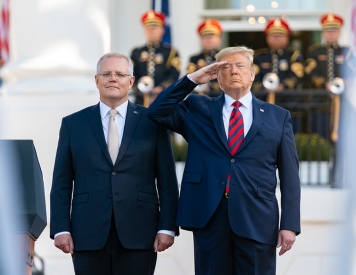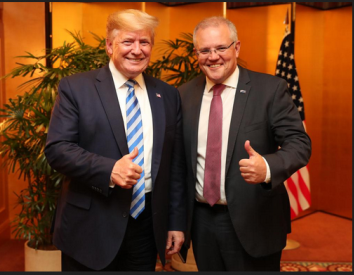Peter Dutton says Nauru's medical facilities are top class — however, like most things this Government says, writes Kellie Tranter, this statement cannot be taken at face value.
THE CASE of the 23-year old woman flown to Australia for medical treatment and then back to Nauru last Friday without it has rightly outraged many Australians. As she had been brought to Australia for an abortion, a fairly commonplace procedure that apparently is difficult to access on Nauru, her case also raises questions about the standard of medical facilities available to asylum seekers.
According to the U.S. embassy:
‘Nauru has two hospitals, which are adequate for routine health problems, but for anything more serious you will need to fly elsewhere.'
This echoes the U.S. Department of State, saying a little more expansively:
'There are few health care facilities available in the Republic of Nauru. Medical care for routine problems is available, but not up to the standards of industrialised countries. On occasion, basic medications can be difficult to obtain. Emergency response capability is extremely limited. Serious medical conditions requiring hospitalisation and/or medical evacuation to the United States can cost thousands of dollars. Doctors and hospitals often expect immediate cash payment for health service. A recompression chamber is located in Nauru. Before diving, check that facilities are operational.'
The State Department’s page was last updated in July this year, which postdates the claim by the Immigration Minister Peter Dutton that he had
“... been to many hospitals in regional Australia, including in towns where people would say that those hospitals aren’t up to the standard of those in Nauru.”
(Of course, this does beg the question: What has the Government done about those regional hospitals?)
Our stalag on #Nauru has a better hospital than the one in your community. http://t.co/mIzqAoTHmm #auspol #asylumseekers
— FearDeptAU (@FearDeptAU) March 27, 2015
The U.S State Department’s assessment is far more instructive than Malcolm Turnbull’s response in Question Time last week, when he said that if asylum seekers required medical assistance they will receive it, whether on Nauru or in Australia.
According to Turnbull:
“That is the Government’s commitment. If there is a complicated pregnancy, or an assault where a person can’t be given appropriate medical attention on Nauru, they are brought back to Australia.”
In fact, the August 2012 Report of the Expert Panel on Asylum Seekers – praised by both sides of politics – clearly states:
'There should be provision for IMAs [illegal maritime arrivals] in Nauru who are determined to have special needs, or to be highly vulnerable, or who need to be moved for other particular reasons, to be transferred to Australia. The Panel recommends that such IMAs come to Australia on a temporary visa….'
One would have thought that pregnant women and children prima facie would be classified as "highly vulnerable", yet Minister Dutton is clearly prepared to stray from the opinions of experts when he brings in descriptions of this sort of action as a “racket”.
Answering criticisms for not allowing pregnant asylum seekers to travel to Australia to seek medical treatment, Dutton said:
“The Australian taxpayer should know that they’ve provided $11 million for a hospital within the Regional Processing Centre and we’ve provided $26 million to help refurbish the Nauruan hospital. Now, the circumstance is where people can’t get the medical services that they need on Nauru they can go to the international hospital in PNG. We, again, pay for that.”
'I never saw a doctor': #Refugee rape victim says Dutton is lying about abortion. http://t.co/DUTVp65GxQ #auspol pic.twitter.com/9d75E30Qak
— The Age (@theage) October 18, 2015
According to its Nauru Aid Program Performance Report 2013-14, the Australian Government did agree to refurbish the Nauru hospital following a fire in August 2013, and immediately after the fire Australia reallocated $1.2 million of funding to restock all pharmaceuticals and replace other critical equipment, such as an X-ray machine.
Yet footage allegedly taken inside Nauru hospital in June this year should prompt the taxpayer to query how the $26 million was spent and whether or not Australia continues to provide financial assistance to the operating budget to assist in its daily operations.
Further footage, allegedly taken on the road to Nauru hospital in July this year, also calls into question the adequacy of utilities and infrastructure servicing the Nauru hospital and the surrounding area, particularly after heavy rain.
As to the next stage of taking asylum seekers to Papua New Guinea fo treatment, according to Peter Dutton, the Australian taxpayer is funding treatment at the Pacific International Hospital which is a public private partnership venture with the International Public Business Corporation.
As reported earlier this year:
‘... the Pacific International, which opened earlier this year, has been touted as a modern, well equipped medical facility, but as a private hospital is only accessible by the wealthy. Outside its walls, health indicators for PNG are poor, with high rates of infant mortality, extremely high levels of maternal mortality and little access to medical care for the largely rural population.’
Like everything relating to Australia’s offshore detention centres, Government assurances are increasingly difficult to accept at face value. They seldom address the specific problems giving rise to them and they rarely, if ever, make explicit the factual bases upon which they are founded.
Last time PeterDutton accused someone of lying for their own agenda was Sarah Hanson Young And we know who lied then https://t.co/yvdTzpkSXK
— Rowan (@MalCaymanIs) October 17, 2015
If the assessments made by the United States are accurate, then verbal assurances made by the prime minister and the minister for immigration and border protection are inadequate. They pass over the underlying problems and the serious questions which need to be answered — not only in relation to the actual care available to asylum seekers, but also in relation to the specifics of the expenditure of taxpayers’ money on providing them with health facilities.
Kellie Tranter is a lawyer and human rights activist. You can follow her on Twitter @KellieTranter.

This work is licensed under a Creative Commons Attribution-NonCommercial-NoDerivs 3.0 Australia License
Monthly Donation
Single Donation
Dutton is lying about abortion: refugee rape victim http://t.co/4UM14brieG via @smh
— Dave Donovan (@davrosz) October 18, 2015
Do the right thing. Subscribe to IA for just $5.









